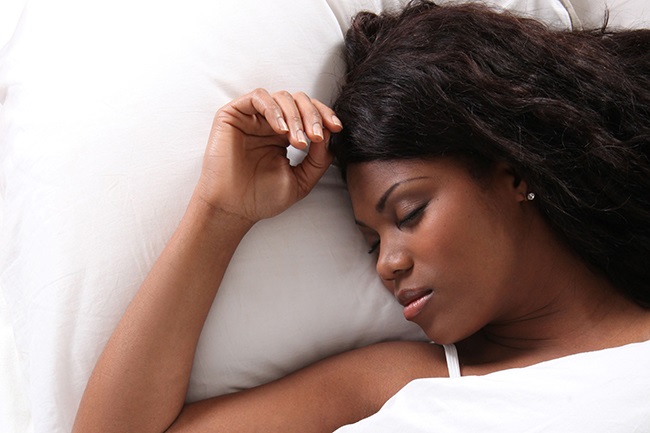
- Adults need on average seven to nine hours of sleep per night.
- The blue light from phone screens, environmental issues or medications can disrupt your sleep.
- Poor quality sleep indicators include mood swings, irritability and trouble falling or staying asleep.
- Although it can be scary, sleep paralysis is your body's way of stopping you from acting out your dreams.
Sleep is as basic a need as eating food and drinking water.
But many still take that basic need for granted by not getting in a good night’s rest every night.
Whether you’re burning the midnight oil hustling to get work complete or you happen to just be doomscrolling for hours on end on the endless social media platforms society has subjected themselves to, chances are you’re not getting your eight hours in.
As much as in this fast-paced and busy world many believe that time spent asleep is time wasted, studies show that on average adults aged between 18 and 64 years old should be getting seven to nine hours of sleep, teenagers between 14 and 17 years old about eight to 10 hours per night and school-aged kids between six and 13 years old need about nine to 11 hours of sleep a night.
READ MORE | 10 sleepcation ideas to add to your bucket list in 2024 for better health
What happens if you getting your eight hours but still waking up tired?
TRUELOVE spoke to Dr Nomathemba Chandiwana, a clinician-scientist who specialises in sleep research at Ezintsha Research Centre, to dive into all things sleep wellness.
Disrupting your sleep
Issues like it being too hot in your bedroom, light pollution or certain medications or conditions like restless leg syndrome you have can all contribute to poor quality sleep. But the most common disruptor is that pesky blue light emitting from your phone screen.
“All mammals work on a body clock, right. So, that’s why even without setting an alarm clock, you will know it’s time for me to wake up, it’s time for me to sleep,” Dr Nomathemba explains.
“So, that’s why when you move to a different country, a different time zone, you’ll wake up because your body clock is used to how you’re doing. So, blue light – it’s disrupting because it’s dark, your body knows it’s time to sleep. So, that blue light is disrupting when you are supposed to sleep and actually it’s telling your brain that I’m awake.”
Dr Nomathemba says, “For adults and children – but mostly for adults – bad quality sleep, you’ll feel sleepy. So, during the day you’ll find like by midmorning or mid-afternoon you’ll actually feel sleepy. You’ve got trouble concentrating, you might have headaches, you might be irritable.”
Here’s how you can tell if you’re having a bad night’s rest:
- Changes in mood and motivation
- Daytime fatigue and irritability
- Difficulty concentrating
- Persistent tiredness despite ample time in bed
- Trouble falling or staying asleep
Sleep paralysis explained
Have you ever felt that odd and terrifying sensation of being woken up in the middle of the night feeling like there’s someone – or something – watching you? But no matter what you do, you can’t seem to move.
This strange phenomenon is called sleep paralysis, also referred to as nagmerrie in some Black communities, and it’s more helpful than one might think.
Dr Nomathemba explains it as “how our body stops us from acting out our dreams, right. So, when you go to sleep, there are different stages of sleep and when you’re in a deep sleep and when we dream, that R.E.M stage of sleep, our bodies are paralysed. And it’s quite scary when it happens to people usually in childhood. We all remember waking up and you feel someone is pressing on you.
“As Black and brown people there’re a lot of cultural things that we put to it. Ain’t nothing sinister, it’s your body stopping you from acting out your dreams. So, when people have sleep disorders – a famous one being Oscar Pistorius who said this happened because he was sleeping – when you’re acting out your dreams, it’s not good.”
READ MORE | Use ambient lighting, plus 4 other ways to style your bedroom for a restful sleep
Sleep disorders
An interesting note from Dr Nomathemba is that sleep paralysis technically helps you from acting out the wild dreams many of us have, but there are other sleep disorders to be aware of.
Parasomnias
Things like abnormal movements, talking in your sleep, night terrors or bedwetting are all instances of unusual behaviours that people experience just before falling asleep, while asleep or during the period between sleep and waking up.
“So, when people actually wake up, drive, you do things and you actually don’t realise but you’re supposed to be sleeping. So, sleep paralysis is important so imagine whatever your dreams are and that happened, that would be dangerous.
“[Bad quality sleep] can cause neuro-degenerative disease and also mood disorders. You can be depressed, and another specialty of mine is that I work in the obesity space. If you don’t sleep well … [there will be] aggressive eating. So, what happened during Covid, when we weren’t sleeping, when we’re on our phones all the time and we’re baking banana bread, we all gained weight … premature ageing as well.”










